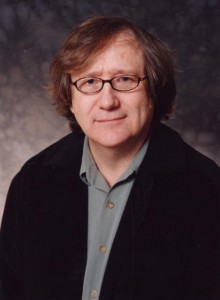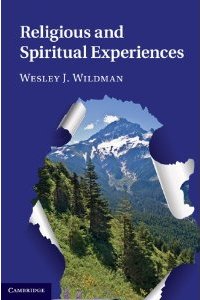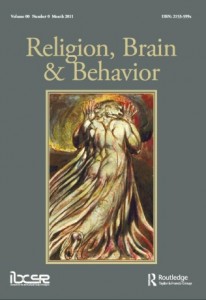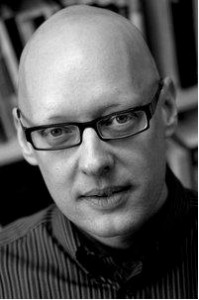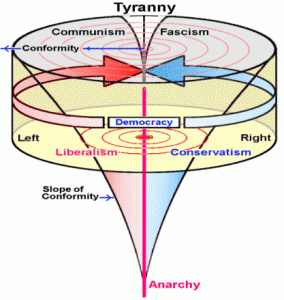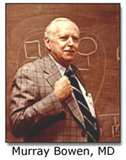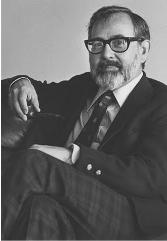 (This address was delivered to the American Theological Society’s annual meeting at Princeton Theological Seminary, March 26, 2010.) PDF version
(This address was delivered to the American Theological Society’s annual meeting at Princeton Theological Seminary, March 26, 2010.) PDF version
This evening I begin with a conventional review of Claude Welch’s life and achievements before turning to some more personal remarks.
Claude Raymond Welch (pictured at right) was born March 10, 1922, in Genoa City, Wisconsin. His parents were Virgil and Deone Welch. His father Virgil was a minister and a Professor of Bible Studies at Upper Iowa University. Claude was the second of their four children, growing up in Fayette, Iowa with older brother Robert and younger siblings Wesley and Irene.
Claude showed early intellectual promise, earning the rare distinction of being on the list of top Iowa state high-school students in five subjects. He was also a state-wide and national debate champion, and played the trumpet. He went on to a BA in History at Upper Iowa University. He received a BD and MDiv from Yale University Divinity School in 1945, and was ordained. He took the PhD from Yale in 1950. His PhD dissertation was published as In This Name: The Doctrine of the Trinity in Contemporary Theology (Scribners, 1952). In that book, Claude predicted a revival of interest in the Trinity as a reaction to its near-dismissal in the nineteenth century, taking a stand against other prognosticators who were already celebrating the death of Trinitarian ways of thinking. Claude was right: his book was one of the first works in a significant reconsideration of the doctrine of the Trinity in the second half of the twentieth century.
He taught at Princeton University from 1947 to 1951, while he was still finishing his PhD, and then moved to Yale Divinity School from 1951 until 1960. While at Yale, he worked with historian John Dillenberger to write a textbook entitled Protestant Christianity Interpreted through its Development (Scribner, 1954; a second and extensively revised edition of that book appeared much later in 1988). He also published his second book in systematic theology, The Reality of the Church (Scribner, 1958), which expressed his strong interest at that time in ecumenism. A Fulbright award took him to Germany to study the theology of Karl Barth in 1956-1957.
Claude moved to the University of Pennsylvania in 1960, where he remained until 1971, holding many administrative positions along with his teaching and publishing responsibilities. He was Chair of the Religion Department, Associate Dean of the College of Arts and Sciences, and President of the American Academy of Religion in 1970. He took another Fulbright year in 1963-1964, this time in Switzerland, where he worked intensively on nineteenth-century Protestant Thought. His translation of several important German works on the Incarnation by Thomasius, Dorner, and Biedermann appeared as God and Incarnation in Mid-Nineteenth-Century German Theology (Oxford University Press, 1965).
His administrative expertise in education joined with a significant research effort to yield two important books. The first, Graduate Education in Religion: A Critical Appraisal (University of Montana, 1971)—known informally as the “Welch Report”—was based on research funded by the Luce Foundation and helped enormously to increase the respectability of religious studies as an academic field. In this book, Claude endorsed Max Müller’s maxim “He who knows one religion, knows none” and argued that the standards for teaching religion in the graduate school context should be the same whether or not the teacher is an adherent of the religion under discussion. Religion, that is, should be taught like any other subject, making use of all relevant disciplines and rooting out ideological bias. The second book was Religion in the Undergraduate Curriculum: An Analysis and Interpretation (Association of American Colleges, 1972), and made a similar case.
The major transition of his career came in 1971 when he moved to the Graduate Theological Union, nestled beside the University of California at Berkeley. He began as Dean (1971-1987) and the following year was also appointed as President (1972-1982). With John Dillenberger, Claude worked tirelessly to lay the foundations of an institution that now produces a very large number of academic doctorates in religious and theological studies within a uniquely integrated ecumenical and multi-religious consortial environment. He strengthened ties to UC Berkeley, enhanced relationships with affiliated centers and institutes, raised money for programs and buildings, and defined the intellectual commitments and institutional trajectory of an exceptional institution in a complex context. He also planned and oversaw the first stage of construction of the Graduate Theological Union’s magnificent central library and administration building.
It is in this period that Claude published the first of two volumes on Protestant Thought in the Nineteenth Century (Yale University Press, 1972). Eminent historian Peter C. Hodgson reviewed the first volume (Journal of the American Academy of Religion 41/4 (1974): 591-596), describing it as “the first truly significant history of nineteenth-century Protestant Thought in the English language” and declaring that “the appearance of this book is a publishing event of the highest significance for the theological world” (591). Despite his grueling administrative duties, Claude carried out the research for the second volume, which was published in 1985, and equally well received. These volumes are his magnum opus, the work of a lifetime, and a priceless gift to fellow scholars and to generations of students. They express not only the historian’s precision and sensitivity to contextual details, but also the nuanced insight of the systematic theologian.
Claude retired from the Graduate Theological Union’s Deanship in mid-1987 but continued teaching and advising graduate students in historical and systematic theology for twenty more years.
Claude met Eloise when they were at Upper Iowa University. They married and raised three children—Eric, Thomas, and Claudia—before divorcing in 1968. Eloise died on August 31, 2009. In 1971 he married Theodosia (Ted) and became step-father to her children, Brad and David; she died of breast cancer in 1978. He married Joy in 1982 and became step-father to her two children, Eric and Keith; Joy died of cancer in 2005. Shortly after, in 2006, Claude moved to Freeport. Illinois, to live near his son, Eric. He passed away on November 6, 2009.
Many of you know these biographical facts. And many of you knew Claude personally or as a colleague or teacher. I have heard a number of stories about Claude’s earlier years and I wish I had known him for longer than I did. When I first met him, his busy life had been transformed by his retirement at age 65 as Dean. The year was 1987 and I was just beginning my doctoral studies. Claude had no intention of retiring from teaching and continued running seminars and advising students. I was one of the doctoral students he advised and I treasure the photograph of his beaming face beside me at my graduation.
My first significant memory of Claude was in the Fall of 1987 in the classroom. He was teaching his signature seminar on nineteenth-century theology to a group of about thirty doctoral and advanced masters students. Having just retired from 16 years of administrative investment in the Graduate Theological Union, Claude was deeply respected and surrounded by an aura of dignity and gravitas that instantly commanded respect from his students. Those seminars on nineteenth-century theology were master-classes, in the sense that he demonstrated comprehensive depth and breath of knowledge, inspiring enormous effort on the part of his students without having to demand it. Some students remember those seminars as uncomfortable events, with Claude silencing over-eager doctoral students with a pointed question or assuming a level of competence that students struggled to attain. Most relished them, though, and I certainly did.
I never met Claude’s first two wives, but I knew his third wife, Joy Neuman, quite well. She was an accomplished editor and I was a frequent visitor in their home, sharing meals with them and watching their semi-retired life unfold over the years. I stayed in touch with them as long as they lived—two decades of wonderful conversations, mutual encouragement, and occasional shared work. Joy died shortly before Claude moved to Illinois.
With some people, the aspect of them that stands out to me is their smile, or their physical stature, or perhaps the timbre of their voice. In Claude’s case, it was his eyes. Claude’s eyes always conveyed something about his personality and state of mind—helped along, I am sure, by the magnifying effect of his thick glasses. It is because of people like him that people use the phrase “the eyes are windows onto the soul.”
Sometimes Claude’s eyes would gleam with pride, as they did when he hooded me at my graduation, or when he held my new-born children in his arms.
Sometimes they would grow intense as he concentrated on conveying some subtle point of theological debate in a seminar or in conversation.
Sometimes those eyes would get dull as he grew tired and grumpy, though he did that with much less frequency as the years went on. He was a tender and solicitous husband to Joy, a gentler and more perceptive man than he may have been when busier and younger. The competitive, ambitious, and razor-sharp elements of his personality were ideal for ranking graduate programs in the “Welch Report” and for making hard administrative decisions, but he had little use for them in his later years. Gradually—with some degree of satisfaction and even relief, I suspect—Claude became more avuncular and jovial, an easy presence with a ready smile, loyal, peaceful, and happy.
Lest this portray an impossibly congenial person, it is vital to recall that sometimes Claude’s eyes would grow hard as steel as he became impatient with foolishness or girded his loins to engage in criticism or debate. I arrived at the Graduate Theological Union formed in the world of mathematics, where the ideas are everything, the game of criticism and debate is central to the sociality of experts, and it is extremely bad form to take any criticism personally no matter how bluntly it is delivered. Claude instantly understood that about me. In an educational environment full of welcome sensitivity that occasionally crossed over into excessive political correctness, Claude relished the game of criticism and debate over ideas, especially theological ideas. I never needed to explain myself to him and he seemed to relax and let his guard down with me. This led to many wonderful experiences and some interesting revelations.
Claude’s eyes would sometimes grow distant and pensive as he contemplated the arc of his career. He trained early as an historian but his dissertation and second book were more systematic theology than historical theology. In some ways he thought of his eventual concentration on historical theology as the arresting of his most fundamental aspirations. When he was joking around, he would say that he was a washed up systematic theologian who got stranded in the nineteenth century. In quieter moments, he confessed to a failure of nerve. I think temperament and circumstances were at least as important as insufficient chutzpah in his decision to focus on historical theology. Claude cared about the robustness of knowledge, including especially the importance of subjecting knowledge claims to data capable of correcting and refining them. He found through long experience that he could achieve that far more effectively in the mode of historian than as a systematic theologian. Moreover, his personal religious beliefs steadily migrated toward the increasingly radical and more agnostic end of the spectrum, where he vacillated between a kind of mystical theologian for whom ultimate reality gloriously defied speech and an exhausted historian who had lost the taste for trying to eff the ineffable. Still, his wistfulness about systematic theology never completely left him and helps to explain why he was so supportive of his doctoral students in theology who leaned more toward systematics than history. Though he probably thought they were more prone to fantasy than is seemly in an academic, Claude also appreciated their artistic flair and their intellectual boldness. Perhaps he saw some of his own theological longings partially satisfied through their efforts.
Sometimes Claude’s eyes would become mischievous. I would love to have in my own mind the memories some of you have in yours of his younger years. I am sure he must have loved to have fun and to make fun, every bit as much as he loved to work and think hard. We played bridge together frequently. Often his eyes would get that mischievous twinkle and an outrageous bid would spring from his reckless imagination, accompanied by a sheepish grin, and burdening his partner—often enough that was me—with an impossible contract. He loved to play, he loved to break the rules, and he loved to make his bridge partners wince and subsequently chuckle at his crinkly eyes and only partly repentant face.
Claude also loved the rituals of life—not so much the religious rituals as the academic and family rituals that mark the passage of time on this twisted rock of a planet. His eyes would sink comfortably into rest at those times. At a meeting of the Pacific Coast Theological Society—a group much like this one—I once saw Claude go outside into a courtyard at Pacific Lutheran Theological Seminary with well known historical theologian Jim Duke. I watched, fascinated, as they embarked on what seemed to be a sacred ritual together. In perfect synchronization, they lit their pipes, held them in one hand with the other hand behind the back, and paced, lock step, around the courtyard, never looking up, just moving together and chatting quietly. Moments like that grounded him.
Sometimes Claude’s eyes would grow dark as he recalled the painful moments of his life. When he recalled his early divorce, or his second wife’s struggle with cancer and her eventual death, his eyes would tear up, glistening atop an abyss of sadness. To misquote Hamlet, Claude did not remain untouched by the slings and arrows of outrageous misfortune.
Those eyes, dancing and glinting and gleaming, steely or dark or misty—it is his eyes that stay with me.
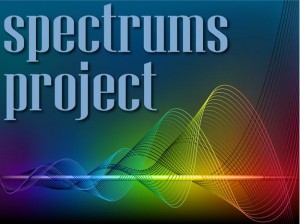 IBCSR’s Spectrums Project is an ambitious attempt to apply what is known about ideological spectrums in politics and morality to the field of religious beliefs and practices. The Project’s goal is twofold: firstly, to deepen understanding of why human beings adopt a spectrum of religious and theological viewpoints; and secondly, to discover strategies for mitigating the problems associated with religious extremism and polarized religious discourse.
IBCSR’s Spectrums Project is an ambitious attempt to apply what is known about ideological spectrums in politics and morality to the field of religious beliefs and practices. The Project’s goal is twofold: firstly, to deepen understanding of why human beings adopt a spectrum of religious and theological viewpoints; and secondly, to discover strategies for mitigating the problems associated with religious extremism and polarized religious discourse.
